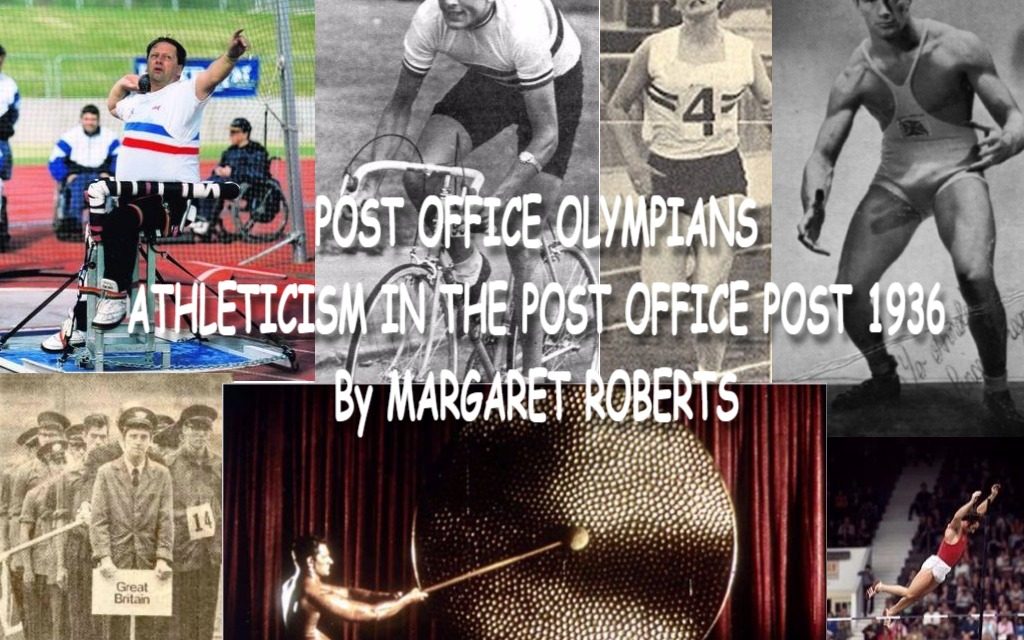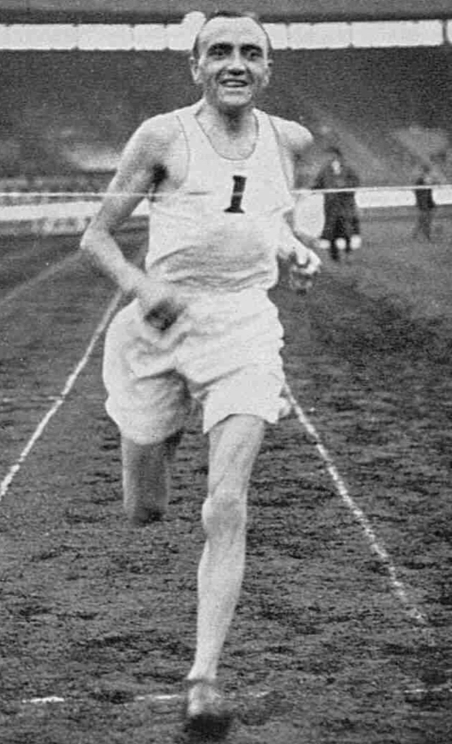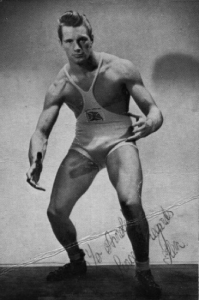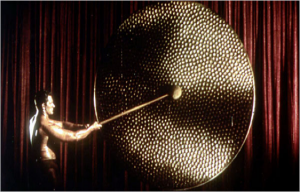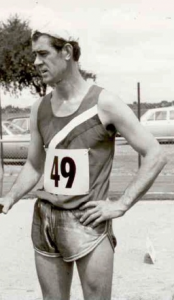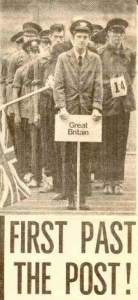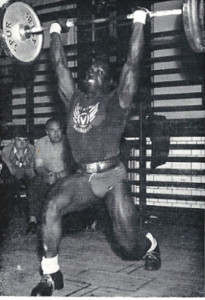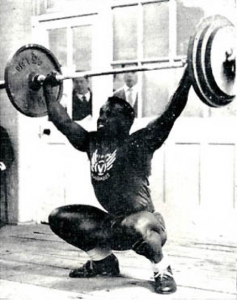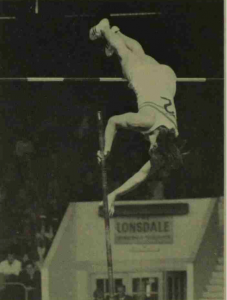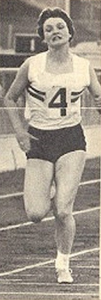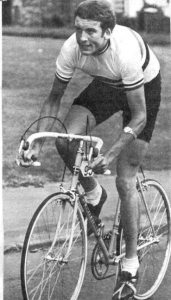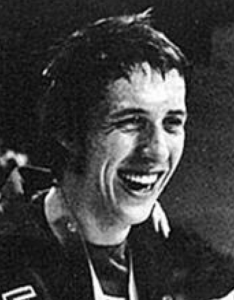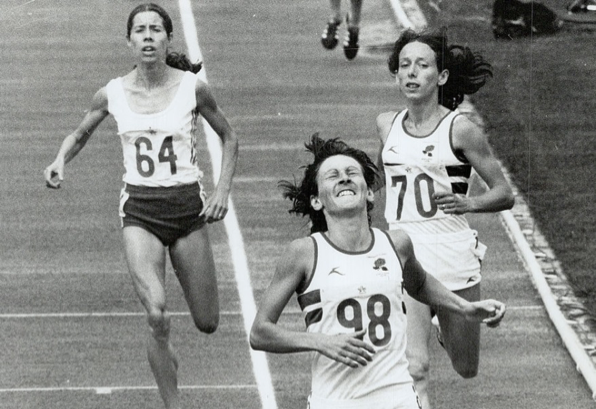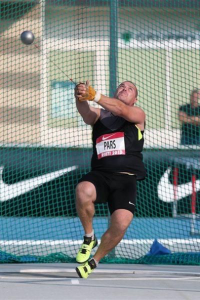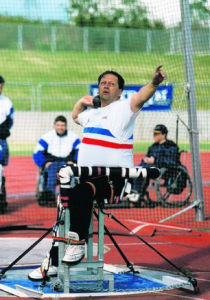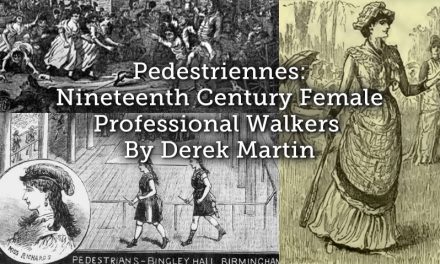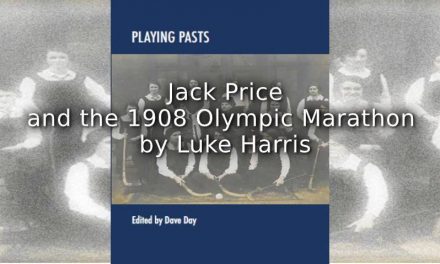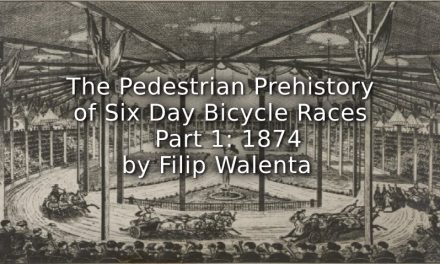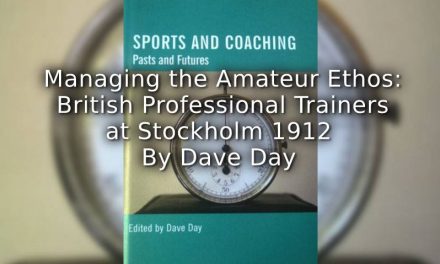Following on from last week’s article “Training while Working: Athleticism in the Post Office pre WWII”, I felt it only right to highlight some more of the employees that represented Great Britain in the Olympic Games post WWII. While only a handful of medals were won by Post Office Olympians, recognition should also be given to those who competed or were short-listed but not ultimately selected, as well as the diversity of the sports in which they competed. Of course nowadays the Olympics are mostly dominated by full-time professional athletes and the notion of fitting training around a 47-hour working week delivering parcels, selling stamps or sorting letters perhaps seems a tad old-fashioned. The Post Office staff magazine, The Courier, highlighted these Olympians and this article has extended on those reports to include some of the further success that these employees enjoyed.
In the 1936 Olympics the Post Office was represented by two athletes – Albert James “Bert” Norris, who was taken on as a Boy Clerk in 1914, was a member of the Polytechnic Harriers Athletic Club and worked in the Saving Bank Department. On June 13th at the White City Marathon, the 37 year -old Norris was not only victorious but finished in a record time of 2:35.20. This caused one contemporary newspaper reporter to write “It is often said that Athletics is a young man’s game, but some of the old ‘uns are giving the younger generation something to think about”. He was chosen along with 3 other men to represent Great Britain in the Marathon, however Bert was not so successful at the Games themselves when he disappointingly dropped out of the race before he had covered half the distance. When the eight members of the women’s gymnastics team boarded their train at Liverpool Street Station in 1936 among their excited number was Brenda Olive Crowe of the Post Office Money Order Department. Regrettably their performance on August 12th was disrupted by a combination of unfortunate circumstances, including a noisy demonstration from the crowd, due to alleged judging errors, the British team reportedly “fared badly”, ultimately being placed 8th in the all-round competition.
- The 46,145th Yard! Bert Norris winning the Olympic trial
The 1948 London Olympics, the first after a 12 year hiatus due to WWII, saw only one PO employee being selected, George Frank Ward, who was a clerical officer in the Savings Bank Department. A member of the Highgate Diving Club in London, George was already the high diving Champion of England when he competed in the 10m platform event at the Empire Pool in Wembley. With an overall total of 88.96 points he finished in 18th position after the 3-round competition.
The Helsinki Games in 1952 again saw only a single competitor from the ranks of the Post Office. Ken Richmond, one time Night Telephonist from the London Telegraph Region Directory Enquiries Department, was a heavyweight wrestler who had competed in the previous Olympic Games and been placed 5th (but had not been working for the PO at that time), he was the 1949 British and Irish Heavyweight Champion, who, prior to the 1952 Olympics, captured bronze at the 1950 British Empire Games. At 6ft 5in tall and 19 stone Richmond came home from Helsinki with an Olympic bronze medal, which he bettered at the 1954 British Empire & Commonwealth Games when he won gold. He also competed in the 1956 Olympics in Melbourne where he was placed fourth, but was no longer employed by the PO. The ripple-armed wrestler is however best known as the bare-chested Adonis who for decades was seen striking the gong that heralded the opening credits for dozens of films produced by the Rank Studio of England. Richmond had already had many film roles as an extra when he was approached in 1955 by J Arthur Rank, who paid him a one off £100 fee to take that famous slow swing at the gong. The famous “golden gong’’ never rang for Ken though as it was actually papier-mâché, and as he often joked, “If you hit that gong, you would have gone straight through.”
- Ken Richmond, wrestler and “gong-man”
The 1956 and 1960 Games had no Post Office workers selected as far as my research can ascertain, however that changed when the Tokyo Games of 1964 heralded the first of a number of Olympics Games where the Post Office was abundantly represented. Firstly Kenneth Hill, who started his life with the Post Office as a Liverpool postie in 1953 before moving to the town’s Postal and Telegraph Office, was shortlisted for the cycling team, but never made the final cut. The reputation of the Golders Green Sub-District Office and Belgrave Harriers Athletic Club were in the safe feet of 50k walker Ray Middleton. Not a household name outside England nevertheless he had an exceptional race-walking career which traversed the 60s and 70s when he won two golds, eight silvers and 4 bronze medals in the British Championships and represented England on 11 occasions, including a silver at the 1966 Commonwealth Games and a 13th at the Tokyo Olympics. Ray won the very first Postman’s Walk race held in 1961 and in September 1970 when the European Postal Road Walking Championships was held in London Ray led a team of colleagues to victory in the 9¼ mile circuit around Crystal Palace (in full uniform with a sack), Ray taking the overall win, thus becoming the fastest postman in Europe!
- Ray Middleton, racing in two different uniforms
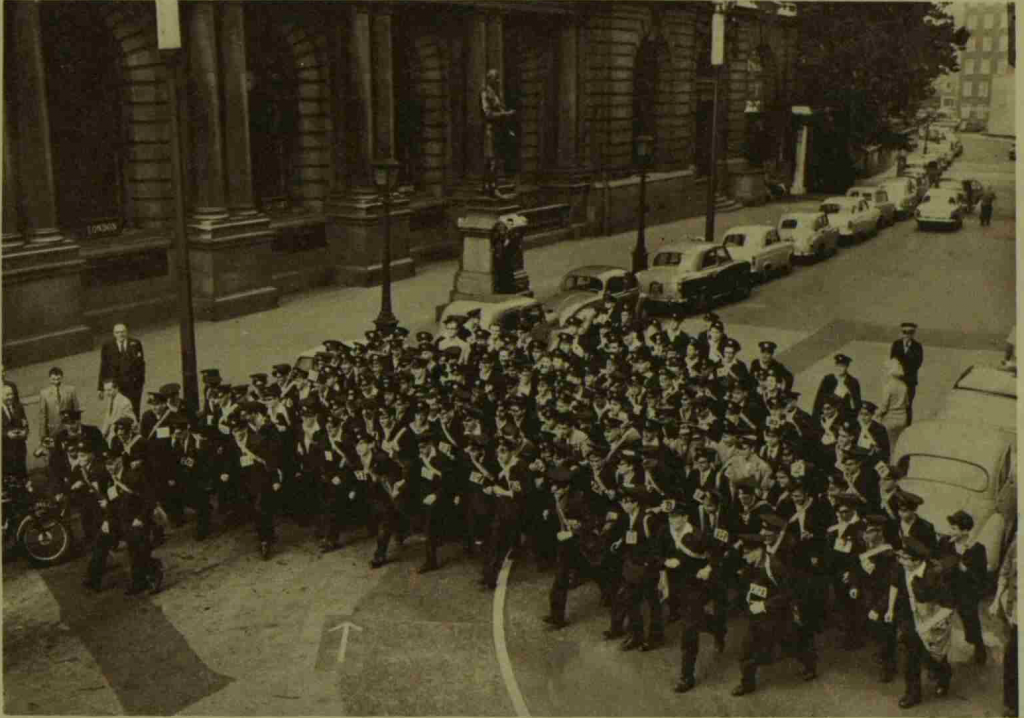
A “Busman’s Holiday” for Postmen: 200 Postmen get off to a good start in the 6-mile walking race around the City of London. They started their energetic race in uniform at the GPO Head Office, King Edward Building. The winner of the race was Mr Ray Middleton of Golders Green. September 29th 1962
Sylvanus Blackman, a postman who walked his round within the Acton Sub-District took 10th place in the light-heavyweight weightlifting. Blackman competed in the previous Olympics but not then a PO employee. He also collected a silver in both the 1958 and 1966 British Empire & Commonwealth Games (in 1958 he competed for Barbados). His son Tim is currently a highly regarded tennis coach in Ruislip. Finally, a telephonist from Wolverhampton, 17 year old Maureen Tranter, was nominated for the 220yd relay team and travelled to Tokyo with the British squad, but was not selected to run. In the years before the next Games Maureen broke the UK indoor 440yds record as well as two indoor world records, namely 300m and 440yds and won silver at the 1966 Commonwealths as part of the sprint relay team, thus proving her potential for future Olympics.
- Sylvanus Blackman in action
The 1968 Olympic Games proved a good Games for the Post Office, with four employees, according to the staff magazine, making the trip to Mexico City and although no medals were won there were some excellent performances with several new personal bests being attained. Mike Bull, whose father John was also employed as a Telephonist in Belfast, was already the 1966 Commonwealth Games pole vault silver medallist, he cleared 16ft 5in at the ’68 Olympics, a British record at the time, but not high enough to bring home a medal. Mike went on to win Commonwealth gold in 1970 and also competed at the 1972 Games but failed to be placed. In the 1974 Commonwealths he won silver in the pole vault and gold in his second disciple of decathlon and in fact is the only athlete to win a pole vault/decathlon Commonwealth double.
Robin Baskerville, the son of Sid Baskerville, who was engaged as Information Officer at Royal Mail Headquarters, competed in the 10m high board diving but failed to qualify for the final, being placed in 27th position. Some years later, in 1983, Robin and his wife Barbara, who were both school teachers at the time, founded a gymnasium in Bath where they have coached and trained national, commonwealth and international level gymnasts. Sylvanus Blackman entered the weightlifting for second successive Games, this time in the middle-heavyweight division where he came 20th. 21 year old Telephone Operator Maureen Tranter also competed in her second Games, this time in the 200m as well as the sprint relay, recording a new 200m PB of 23.5s which sadly wasn’t enough to win a medal, the 4x100m team of which Maureen was a member came 7th in the final. During 1968 Maureen broke two world relay records (4x110yds and 4x200m) as well as the individual UK All-Comers 100m record which she lowered to 10.6s.
- Mike Bull
- Maureen Tranter
The 1972 Munich Olympics saw Stoke-on-Trent PO Technician Phil Griffiths compete in cycling. Griffiths was an excellent domestic cyclist winning many races on British soil and in 1974 he won Commonwealth silver and is one of the few British riders to have held the yellow jersey in the Peace Race. Technical Officer Alan Almond achieved 10th place with his team mates in the coxed fours rowing. Nick Nearchou, who was a Senior Mechanic within the London Postal Region took part in weightlifting but was not placed. The swimmer Brian Brinkley, son of Corinne Brinkley, who was a cleaner at the Head Post Office, qualified to participate in six events in Germany – the 100m, 200m, 400m and 1500m freestyle as well as the 200m butterfly and 4x200m freestyle relay. His best performances came in the 400m freestyle where he reached the final and with the relay team who were placed eighth. He went on to win Commonwealth and Olympic honours after he had left the employ of the Post Office. As a note of perspective; a 1972 newspaper report explained how Brinkley’s mother had taken the £8-a-week job scrubbing floors at her local Post Office for five hours a day starting way before dawn, without this money the family would not have been able to afford the cost of their son’s travelling expenses. It cost £6 a week for Brinkley to make the 120 mile round-trip to the nearest indoor pool, and as he was still at school at the time he didn’t qualify for any grant money. Maureen Tranter appeared in her third games, this time turning out in the 4x400m relay, where the team came fifth in the final.
- Phil Griffiths
- Brian Brinkley
Three employees took part in the 1976 Games held in Montreal. Cyclist Phil Griffiths, in his second Olympics, together with Wolverhampton Telephone Engineer & sprint cyclist Trevor Gadd, initially selected to ride the Kilo but was switched to the individual pursuit where he came twelfth; Gadd felt at the time the swap robbed of a lifetime opportunity to win an Olympic medal. Bad luck seemed to haunt him when during the heats he was brought down through an illegal manoeuvre by the American Lee Barczewski and consequently large splinters of African Hardwood track had to be removed from his back using pliers before he could compete in the next heat. Griffiths came sixth as part of the 100k Team Time Trial but did not finish in the road race. Mary Stewart, a Clerical Officer from Birmingham and a member of Birchfield Harriers contested the 1500m, finishing fourth in her semi-final, just failing to qualify for the final. She did however win gold at the same distance in both the European Indoor Championships of 1977 and the 1978 Commonwealth Games.
- Mary Stewart (No. 98)
1980 and Moscow was another fallow year for the Post Office with cyclist Steve Cronshaw being in contention for an Olympic place but in the end wasn’t selected. Four year later in 1984 the Olympics were held in Los Angeles. Two employees, posties Dennis Jackson and Benny Graham were both contenders for the 50k Road Walk but again both were unsuccessful in making the final cut. Doncaster Sub-Office Assistant Arthur Spencer took part in the free pistol shooting where he came 28th. Finally as the professional athlete began more prevalent, the 1988 Game in Seoul saw Mike Jones, a Security Driver at the Redhill Mechanised Letter Office take part in the hammer. His qualifying throw was measured at 70.38m but was not enough to see him progress to the final. However he did go on to win the gold at the 2002 Manchester Commonwealth Games, he competed for over 20 years all-told and he holds fourth place on the all-time list of British hammer throws. In the Paralympics at Seoul PO Equal Opportunities Consultant at the Royal Mail in Oxford, Ian Hayden, who was offered the job after being invited to open the disabled access entrance at St Aldate’s Post Office, won gold in both the javelin and discus and silver in the shot. He went on to win two golds at the 1990 World Championships in Holland and in the 1992 Barcelona Games he won double silver.
- Mike Jones
- Ian Hayden
As can be seen the proud tradition of sport within the Post Office has continued over the years post WWII and although there may be a number of employees that I have failed to discover, this article shows that the company still has a lot to be proud of.
Article © Margaret Roberts

